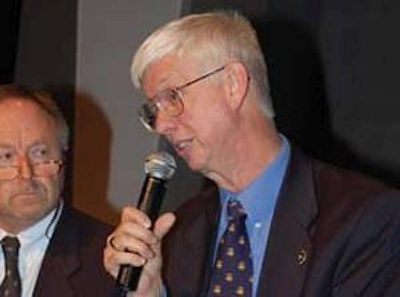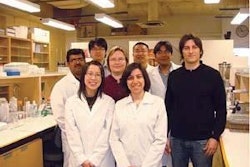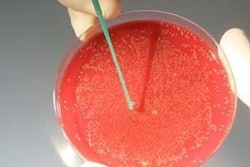
Sustainable agriculture can mean different things to different people, and this can lead to lively discussions on this topic. At the Alltech 25th International Animal Health and Nutrition Symposium a roundtable discussion was held to present opinions on what sustainable agriculture means to consumers, non-governmental organizations (NGOs), food companies and society at large and how this will affect agriculture. The panelists were Dr. Lutz Goedde, deputy director Agriculture Development, Bill & Melinda Gates Foundation; Dr. Michael Boehlje, distinguished professor in the department of agricultural economics, Purdue University; and Philip Wilkinson, managing director, 2 Sisters Food Group, the United Kingdom’s largest chicken processor.
Goedde said that the Gates Foundation’s interest in agriculture stems from the group’s belief that “every person on this planet has the right to live a healthy and productive life.” He said, “Unless people have the means to earn an income that provides them food security and allows them to be well nourished and productive members of society then you really don’t have a starting point.” The foundation is concerned with the 1 billion people who live on less than $1 per day and the 1.5 billion people who live on $2 per day, according to Goedde.
Must double agriculture’s productivity
“Economic and financial sustainability are the first part of sustainability,” he said. Because of this, Goedde expressed concern that food costs not increase so that the poorest billions of people on the planet can’t afford enough food to properly nourish themselves. Based on projections for growth of the world’s population, this won’t be an easy task. “We need to double the current productivity of agriculture by 2025 to meet the world’s food needs,” he said.
Wide spread adoption of innovative technology is the key to continuing the increase in agricultural productivity. “We should use all of the tools available in the tool box,” Goedde said. Because of this, the Gates Foundation is not against the use of GMOs, according to Goedde.
Precision agriculture
Boehlje said that scarcity induces innovation; but he is worried that productivity increases won’t be adopted because of public policy or that technological improvements won’t come fast enough to feed the world’s growing population.
Boehlje said that modern intensive agriculture is best referred to as “precision” agriculture and that this can be sustainable. “Precision agriculture has the potential to be just as sustainable as traditional agricultural techniques. Precision agriculture and sustainability are not necessarily at odds with each other,” Boehlje said.
Water availability will be the most important aspect of sustainability, according to Boehlje. The problem will be both the availability and quality for water. Water will be a global and a local problem. Goedde agreed and said, “We need crops with better water efficiency.”
Engaging NGOs
The question of whether or not a food company should engage in discussions with NGOs was posed to Wilkinson. “You don’t engage NGOs at your own peril,” he said. “I take a deep breath, bite my lip and engage them. If you don’t engage them they might decide how you will market chicken and eggs.”
“In the UK (United Kingdom) sustainability revolves around customer expectations and opinions,” Wilkinson said. “In the UK, if you sell any protein retail, you have to have a corporate social responsibility program.” He explained that most meat and poultry products sold at retail are sold under the private label brand of the super market. He said that there is no premium paid for meeting these expectations, it is just a cost of entry into the market. He expects that this soon be a cost of doing business in the U.S. as well. Boehlje agreed and said, “Sustainability is going to become an expected way of doing business kind of like how food safety is expected. Most people won’t pay more for it, but it will be a price of entry into the market. This whole movement will go forward.”
Educating the media
The media plays a large role in shaping the public’s perception of what is and isn’t sustainable. Wilkinson said, “Media has a tremendous impact on the public’s perception of what sustainability is.” He said that public perception can be manipulated rather easily by the media. He cited the example of a “chicken out campaign” started by a celebrity chef on TV. If all of the chickens raised in Britain were raised on range, as was suggested by the “chicken out campaign,” it would consume all of the available land in the country, according to Wilkinson.
Combating and or preventing these types of campaigns from gaining traction will require education for the media. Boehlje asked whether or not the media is shaping public opinion or responding to public opinion? He said that a lot of children do not believe that intensive agriculture is sustainable. Because of this, he speculated that the media that agriculture needs to be concerned about might not be the press, but text books publishers.
Goedde said that when he teaches college courses he always asks students whether or not they think the green revolution was good or bad for the environment. He said that around 90% of college students that he asks think that the green revolution is bad for the environment. “The media needs to be educated about agriculture so that they can understand sustainability in agriculture,” he said.

















